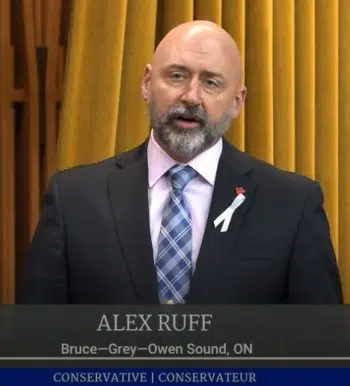Listen to Bruce-Grey-Owen Sound MP Alex Ruff advocating for the creation of the committee in the House on Tuesday, Dec 6 2021
A special parliamentary committee will be appointed to review the events related Afghanistan’s fall to the Taliban and the Canadian government’s contingency planning in relation to it as well as its evacuation efforts.
Conservative Leader Erin O’Toole introduced the motion in the House of Commons this week and Bruce-Grey-Owen Sound MP Alex Ruff seconded it.
The motion was debated Tuesday in the House of Commons, and was carried in the House Wednesday afternoon.
This new parliamentary committee will have 12 members: six from the Liberals, four from the Conservatives, one from the Bloc Quebecois and one from the NDP.
Ruff told the House of Commons in a speech Tuesday, “We’ve got to learn what went right and what went wrong. We, Canada, can’t make the same mistakes in the future.” He added, “If you don’t actually learn from it and apply it in the future, it’s all a waste of time, and this is key for any future diplomatic, humanitarian or military missions regardless of where it is in the world, as we deal with risks. But more importantly we need to do this so that we can help those Afghans that are still in dire need of our support and help and are actively being hunted by the Taliban and their lives are at risk.”
Canada has said it will resettle up to 40,000 Afghans through a special immigration program, but so far, roughly 4,500 have arrived since the Taliban took over the country in August. Thousands are believed to be waiting in Afghanistan and third countries, hoping to come to Canada.
Ruff spent over 25 years in the military including two deployments to Afghanistan in 2007 and 2012.
He told the House of Commons Tuesday, “I depended upon, daily, these interpreters in order to communicate, understand the cultural differences and do my job in helping give them a better life. The biggest thing I remember from that tour more than anything is talking to the local Afghans. They’re no different that any one of us. People around the world are all the same. They just want to live in peace and prosperity, put food on the table and allow their children to have a better life than them– and under the Taliban, women and girls can’t go to school. We should always be fighting against regimes like this no matter where they are in the world.”
Ruff suggested a number of solutions for the proposed committee to focus on, which he says have come from Non-Government Organizations (NGOs), charities and veterans who continue to work to house, protect and evacuate people from Afghanistan.
He told Parliamentarians, “Stand up an interdepartmental task force focused on safeguarding and evacuating eligible Afghans remaining in Afghanistan. Priority must be on having a single minister, single leader to run the interdepartmental task force empowered to coordinate and execute this.”
Ruff told the house he’s gotten feedback that during evacuation operations, interdepartmental communications were not working well between Global Affairs Canada and Immigration, Refugees & Citizenship Canada.
He told Parliamentarians, “Additional resources have to be brought to bear. IRCC staff are being overwhelmed and likely are experiencing precarious PTSD because they don’t have the policy support and leadership to solve the problems.”
In an interview Wednesday, Ruff said, “IRCC workers have been working very hard but they’re now at capacity or have surpassed capacity, so they need extra resources in order to get through that backlog and get through these files so they can be processed immediately.”
He suggests the committee should focus on application processing, possibly getting biometrics into Kabul, and adding, “A mechanism needs to be put in place to get these people the passports out of Afghanistan. Applying for a passport at this time can result in a family being targeted and killed.”
He’s also advocating for less restrictive funding parameters, noting, “I understand that this funding needs to be tracked, but right now it’s too bureaucratic, too complicated to get the help needed as mentioned to support these safe houses and more.”
Ruff said Wednesday, something needs to be done about the funding with regard to the evacuation effort explaining, “This isn’t a lot of money in the big picture to operate the safe houses and some of that support that is required to keep these people alive as they’re literally hiding and being hunted by the Taliban.”
The committee will produce a report within six months. It will also have some access to various government documents pertaining to the situation, but Ruff is optimistic the committee can accomplish more than the production of a report within a six-month time frame, saying, “By putting these solutions on the record and getting them out there, it’s a way to actually get them into that report, but if the government knows they’re already coming and it’s going to make that final report, it’s in their own best interest to implement it sooner than later and take those good ideas.”
Committee members haven’t been selected yet. Ruff has indicated he’d be more than willing to sit on that committee. The first meeting is due to take place on, or before December 17th.
“If we don’t do this now — any mission, whether it’s diplomatic, international development or military around the globe, we’re going to have a heck of a time getting interpreters, cultural advisors, local nationals to then step up and help those future missions and future endeavours,” says Ruff.
My speech yesterday on the need for a Special Committee on Afghanistan that was successfully passed in the @OurCommons today. Canada needs to step up for those that helped us! #BruceGreyOwenSound https://t.co/DAANfI2qOO
— Alex Ruff (@AlexRuff17) December 9, 2021




